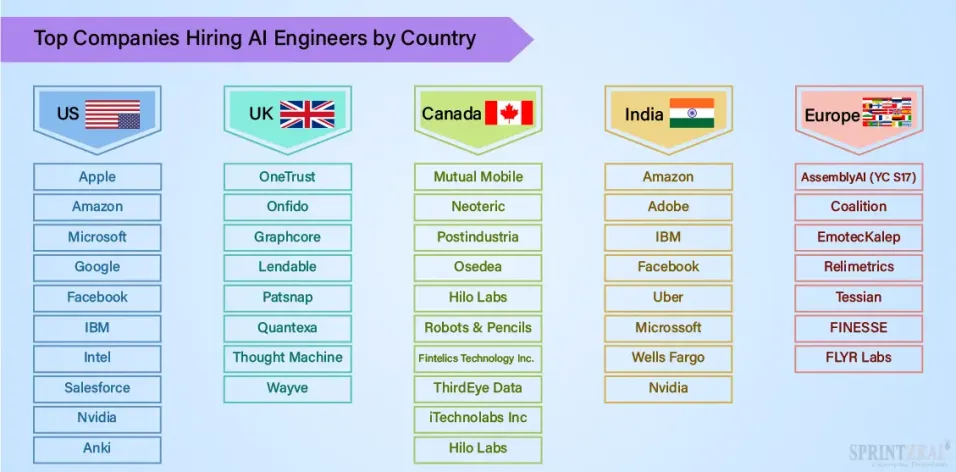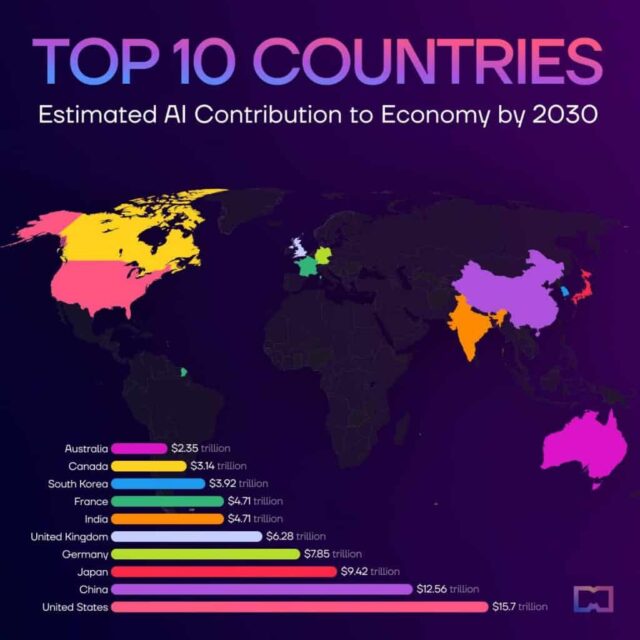You’re an AI engineer, you’re innovative, you’re ambitious. Why not explore international opportunities for AI Engineers in other countries?
Have you ever thought about the possibilities that the international stage might offer? Countries across the globe are in a frantic race to secure top talents in Artificial Intelligence and Machine Learning. They’re offering competitive salaries and the opportunity to be at the forefront of technological advancements.
But where should you go? What kind of roles are available? And how can you navigate the challenges that come with moving abroad?
Let’s get into these unanswered questions and explore the potential of going global in your AI career.
Key Areas of Discussion
- International markets like the US, Canada, China, and the UK offer promising opportunities and competitive salaries for AI engineers.
- Visa procedures are crucial and manageable with research, demonstrating your skills and qualifications for work visas.
- Cultural adaptation is key for successful integration in diverse work environments, including overcoming language barriers and understanding social norms.
- Success stories of global AI engineers highlight the benefits of international opportunities, including career growth, networking, and diverse skill-set development.
Identifying Potential International Opportunities

When exploring international opportunities as an AI engineer, it’s essential to focus on key markets such as the US, China, and the UK, known for their robust AI industry and competitive compensation packages. These markets are top AI hubs, teaming with AI researchers and Machine Learning enthusiasts. Your geographic location can significantly influence your exposure to diverse cultures, perspectives, and AI engineer salaries.
Being in these countries or working remotely with an international team, you’ll find yourself amid the latest AI trends and discussions, expanding your professional network and skill set. You’ll not only get the chance to work with the latest technologies but also contribute to shaping future AI policies, especially around sensitive issues like personal data.
Working abroad in AI isn’t just a career move; it’s a personal growth journey. The international experience can equip you with a global outlook, making you more adaptable and innovative—qualities that are highly sought after in the dynamic and rapidly evolving AI industry.
Visa Procedures for AI Engineers
Navigating the visa procedures can be a critical step in your journey as an AI engineer seeking international opportunities, as these procedures can vary greatly depending on the country and the type of visa required. It’s not just about getting a ticket and hopping on a plane. It’s about understanding the nuances of different visa procedures and ensuring you meet all the requirements.
For instance, to obtain work visas, you may need to demonstrate your skills and qualifications. This often involves providing documentation of employment offers and your educational background. Some countries have specific visa categories for skilled professionals like you to attract the best talent in the field of AI. The process can appear complex, but with diligent research, it’s entirely manageable and most companies will handle the visa process for you.
Top Countries for AI Jobs
Let’s dive into the top countries for AI jobs, each offering unique opportunities and challenges for AI engineers like you. The United States, leading the pack, has a high demand for AI skills with salaries averaging a whopping $314,000 for senior roles. It’s a lucrative arena where you can put your data prowess to work.
Next, there’s China, where there’s going to be a shortage of around four million in AI talent. This gap creates a significant demand for skilled AI professionals and expertise could be the key to unlock many opportunities.
Canada is another country to consider. It’s seen a 1,069% growth in AI job demand since 2013, offering salaries averaging $85,978 per year.
The UK, on the other hand, has tripled its demand for AI skills in the last three years, offering salaries above the national average.
Lastly, Germany is set to face a shortage of three million skilled workers overall by 2030, potentially impacting AI and machine learning development. It’s an emerging market for AI researchers, where your skills could make a true difference.
Cultural Adaptation and Challenges
As an AI engineer venturing into international territory, mastering the art of cultural adaptation isn’t just beneficial, it’s essential to effectively navigate the diverse and often challenging work environments you’ll encounter. The global AI scene is growing with many opportunities, and embracing cultural differences can unlock unprecedented avenues for collaboration and innovation.
4 key cultural adaptation challenges you might face include:
- Language Barriers: Effective communication is critical in any work setting, especially in the world of AI. Overcoming language barriers ensures seamless interaction and mutual understanding within global teams.
- Differing Work Styles: Each culture has its unique approach to work. Adapting to these varying styles can be challenging but crucial for team synergy and productivity.
- Varying Social Norms: Understanding and respecting social norms pave the way for stronger relationships and successful project outcomes.
- Time Differences: Time zones can impact communication, coordination, and collaboration, leading to delays in responses and potentially disrupting workflow continuity.
Your ability to be open-minded and flexible will be your most valuable asset. Successful cultural adaptation isn’t about losing your identity; it’s about finding common ground, respecting differences, and fostering a spirit of unity. So, as you dive into the Global AI scene, remember that cultural adaptation is your passport to success in diverse work environments.
Success Stories of Global AI Engineers
Diving into the success stories about global AI engineering, you’ll find a common thread – the pursuit of international opportunities, competitive salaries, and diverse skill sets are key to climbing the ladder in this lucrative field. These success stories underscore the value of AI talent and the rich rewards awaiting those who go global.
Take, for instance, AI engineers in Silicon Valley, Beijing, and London. They’re earning top dollar, with some salaries exceeding $300,000 annually. It’s not just about the money, though. These engineers have leveraged international opportunities to refine their diverse skill sets, often backed by advanced degrees from prestigious institutions.
What’s more, networking is a significant part of their success. By collaborating with international peers, they’ve fostered innovation and accelerated their career growth. And they’re not alone. Top companies like Google, Amazon, and Tencent are all vying for AI engineers with diverse experiences and skills.
Which Country Is Best for an AI Engineer Job?
As an AI engineer, consider factors like salaries, job perks, cultural aspects, language barriers, work-life balance, and workplace diversity. The US, China, UK, Germany, and Canada offer unique opportunities, each with its own advantages with most having offices based in the US.
You have to decide which will be the best career move for you and culturally where you can thrive and feel comfortable to adapt.
Which Country Has the Highest Demand for AI?
You’re witnessing the US leading in AI demand globally. AI adoption trends here, fueled by tech giants’ investments and governmental support, significantly impact employment. However, AI education is vital worldwide, including in developing countries.
The U.S., UK, Canada, and Germany are all prime destinations for AI talent due to their high demand, competitive salaries, and education opportunities. However, consider China’s ambitious AI goals despite its current talent shortage and there are many US companies based overseas.
There’s a wealth of prospects worldwide and navigating visa procedures, adapting to new cultures, and identifying top countries for AI jobs can be challenging, but it’s worth it. Your skills are in high demand and you’ve got the chance to shape the future of tech.
Go beyond traditional boundaries, embrace diverse roles, and be part of the global AI success story.



